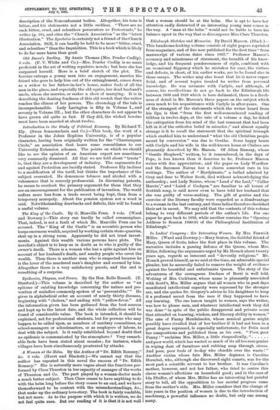Edinburgh Sketches and Memories. By David Masson. (Illack.) — This handsome-looking
volume consists of eight papers reprinted from magazines, and of five now published for the first time" from manuscript of various dates since 1867." Professor Masson's accuracy and minuteness of statement, the breadth of his know- ledge, and his frequent ponderousness of style, combined with an occasional flippancy which he mistakes for ease, the virtues and defects, in short, of his earlier works, are to be found also in these essays. The writer may also boast that he is never super- ficial, and of several topics treated he writes from personal knowledge. He was intimate with Carlyle, and although, of course, his recollections do not go back to the Edinburgh life between 1809 and 1828 which is here delineated, there is a fresh- ness of detail in Mr. Masson's three papers on the subject which owes much to his acquaintance with Carlyle in after-years. One of the strangest of the statements which the writer heard from his lips, is that "from the first well-remembered reading of Gibbon in twelve days, at the rate of a volume a day, he dated the extirpation from his mind of the last remnant that had been left in it of the orthodox belief in miracles ;" and almost equally strange is it to recall the statement that the spiritual triumph which enabled him to understand "what the old Christian people meant by conversion" was due to Goethe. Some happy hours with Carlyle and his wife in the well-known home at Chelsea are pleasantly described by Mr. Masson. Of Allan Ramsay, whose "Gentle Shepherd," written, be it remembered, in the days of Pope, is less known than it deserves to be, Professor Masson writes with due appreciation; and the paper on Lady Wardlaw and the Baroness Nairne has a charm somewhat rare in his writings. The author of " Hardyknute," a ballad admired by Gray and dear to Walter Scott, died without acknowledging the authorship ; and Lady Nairne, whose "Land o' the Leal," "Caller Herrin'," and "Laird o' Cockpen " are familiar to all lovers of Scottish song, is said never even to have told her husband that she was guilty of verse-making. The gift of genius and the exercise of the literary faculty were regarded as a disadvantage to a woman in the last century, and these ladies therefore cherished their art in secret. We may add that the contents of this volume belong to very different periods of the author's life. For one paper he goes back to 1856, while another contains the "Opening Address to Session 1890-91 of the Philosophical Institution of Edinburgh."


















































 Previous page
Previous page